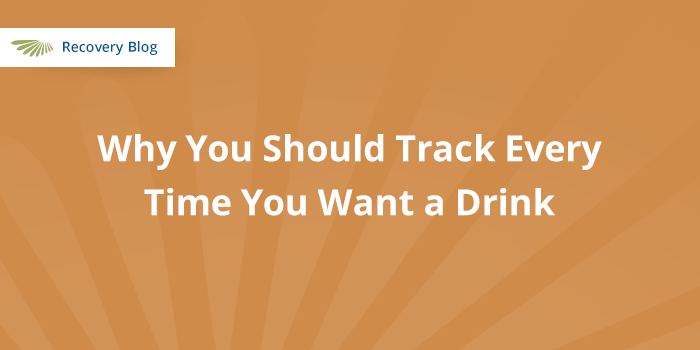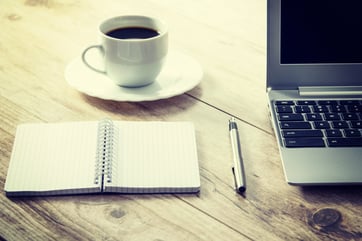Alcohol Screening: Are You Drinking Too Much?
Many people think that alcoholism and alcohol addiction are characterized by drinking heavily to...

Have you noticed that you're drinking more than you used to? Or at least more regularly? Is alcohol impacting your work, home or social life? Has someone commented on your drinking, even if it was a joke? Are you reaching for a drink because you're bored, stressed, or it's just sitting in your fridge? If you answered "yes" to any of these questions, you may have an addiction to alcohol and it's time to evaluate your drinking. A quick way to assess your drinking patterns is to track your alcohol consumption with a logbook.
 Keeping track of your thoughts about drinking, the times you really want a drink, and the times you are actually drinking will give you a clear picture of what your drinking ‘triggers’ are and if your alcohol consumption is becoming problematic. A good drinking logbook will help you track: how often and how much you drink; where you drink and what you're doing at the time; who you drink with; how much you're craving a drink; and what you're thinking and feeling before you drink. By identifying triggers or patterns in your drinking, and figuring out what else you could be doing instead of drinking, you’ll have an easier time cutting back, or stopping altogether.
Keeping track of your thoughts about drinking, the times you really want a drink, and the times you are actually drinking will give you a clear picture of what your drinking ‘triggers’ are and if your alcohol consumption is becoming problematic. A good drinking logbook will help you track: how often and how much you drink; where you drink and what you're doing at the time; who you drink with; how much you're craving a drink; and what you're thinking and feeling before you drink. By identifying triggers or patterns in your drinking, and figuring out what else you could be doing instead of drinking, you’ll have an easier time cutting back, or stopping altogether.
Here are a few examples of journal entries.
Example 1
When: Wednesday after work
Where: At home
With who: By myself
Activity: Watching TV
How much: 4 beers
Craving intensity 1-10: 3
Thoughts: I've had a long day and had to work late, the kids are in bed, I just want to relax in front of the TV with a few beers and zone out. Tomorrow's going to be another late night, I can't seem to get ahead of my workload.
Feelings: Stressed and tired.
Alternative: I could swap out some of the beers for a non-alcoholic drink. I worked late and missed dinner, so maybe if I'd eaten before sitting down in front of the TV I wouldn't have had as many drinks. I should talk to my boss about my workload to see if someone can help and then I'll be less stressed.
Example 2
When: Saturday night
Where: Club
With who: Friends
Activity: Celebrating a birthday
How much: 2 shots, 4 cocktails
Craving intensity 1-10: 7
Thoughts: We're out celebrating so I'm expected to pay for a round of birthday drinks and keep up with everyone else.
Feelings: Excited to be out with friends, anxious because I know I'll drink too much, worried about the hangover I'll have tomorrow.
Alternative: Drive to the club so that you have a reason for not drinking. Say that you have an early shift at work the next morning or that you have a lot of work to do to prepare for a meeting on Monday so you can't afford to be hungover. Order non-alcoholic drinks from the bartender instead of letting friends buy your drinks – they'll never even notice that your cocktails are alcohol-free.
Example 3
When: Tuesday Morning
Where: Work
With who: Coworkers
Activity: Trying to finalize a new budget, but certain team members are not pulling their weight
How much: didn’t actually drink
Craving intensity 1-10: 9
Thoughts: I don’t understand why these people don’t understand how to do their jobs. Do I have to do everyone’s work for them? I need a drink. Maybe going for a drink at lunch can help calm me down for a more productive afternoon.
Feelings: I’m so frustrated and angry!
Alternative: I could go for a short walk now to calm down. Maybe have a glass of water or a snack to step away from the situation for a bit. Next time, I can make sure the rest of our team understands what they’re supposed to be working on before the deadline. I could go for a jog at lunch if I am still upset and that can help me burn off some of the stress and frustration.
Once you identify people, moods, or situations where you're most likely to drink, you'll be able to focus on making effective changes to your environment. You may not be able to see the patterns right away, or identify what else you could be doing in the moment other than drinking, but the journal gives you the opportunity to revisit the times you drink, or when you’re thinking of drinking, to see what you could change in your life to make an impact.
When you keep a logbook it's important that you're honest with yourself and track every drink and every time you’re thinking about, and craving, alcohol. Try to keep your journal for 3 to 4 weeks to allow enough time for patterns to emerge. If you think, or know, that you're drinking too much, now is the time to cut back and get help.
Many people think that alcoholism and alcohol addiction are characterized by drinking heavily to...
Nowadays, it’s almost impossible to ignore the constant bombardment of advertising day-in and...
After a long day, there is nothing more relaxing than having a few drinks to help you unwind,...